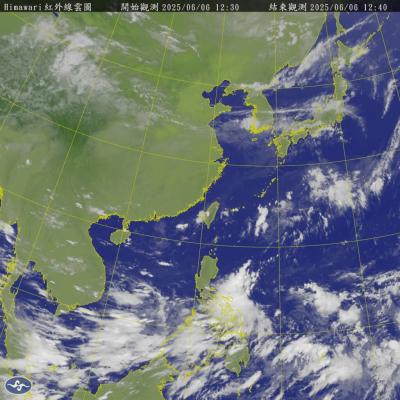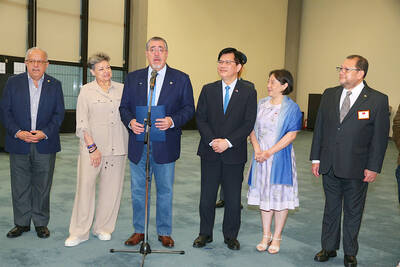It has long been Taiwan's NT$480 billion (US$15 billion) question: Will the opposition-controlled legislature agree to buy a package of sophisticated US weapons -- or will it keep balking for fear the deal will trigger an escalating arms race with China?
The debate reflects fundamental issues confronting this nation.
Both the Chinese Nationalist Party (KMT) and its ally, the People First Party (PFP), favor eventual unification with China. Critics suggest their objections to the weapons buy are not based on fiscal responsibility, but on a desire to placate China's leaders.
They also suggest that former KMT chairman Lien Chan (
The special arms procurement budget bill remains snagged in controversy, with opposition lawmakers preventing it from getting even a preliminary hearing.
Valued at NT$ 480 billion (US$15 billion), it includes eight diesel-powered submarines, 12 P-3C maritime patrol aircraft and three PAC-3 Patriot missile batteries.
Government supporters have accused the opposition of playing obstructive games with the issue so they can paint Chen's administration as incompetent.
"The opposition has been stopping everything the DPP proposes, not just the arms deal," said DPP Legislator Hsiao Bi-khim (
The opposition has denied this, saying it takes a principled stand on major government initiatives like the weapons purchase -- particularly in light of a budget deficit that last year exceeded NT$250 billion.
But the government insists the package is necessary, despite the deficit, for Taiwan to defend itself against a rapid Chinese military buildup that began in the mid-90s.
That buildup's centerpiece is a panoply of weapons systems oriented toward a possible invasion of Taiwan, independent defense analysts say.
Alexander Huang (
He says the submarines and the anti-submarine aircraft would help counter a blockade, while the Patriots would help protect the nation's infrastructure against incoming missiles.
Ellis Joffe, a China defense expert at the Hebrew University of Jerusalem, says the fact of the weapons deal is far more important than its individual components.
"China's main aim is to conquer Taiwan before the US finds the time and determination to intervene," Joffe says, alluding to Washington's hints that it will come to Taiwan's aid if China attacks. "The longer the island can keep up its defense, the better, so any arms will contribute to this."
Last month the US Department of Defense published a report describing how China has pointed 650 to 730 missiles at the country, with about 100 being added each year.
The report referred to the passage in March of a Chinese law codifying the use of force if Taiwan moves toward independence.
Ma Ying-jeou (
A shoo-in to head the KMT' 2008 presidential ticket,Ma is regarded as a strong backer of his party's policy of reconciliation with China -- a stance that would appear to put him at odds with the weapons deal.
Ma's confident said a change in Lien's position was now possible that "Ma will not oppose the deal just for the sake of opposing."
Lawmaker Hsiao said the DPP would take a wait-and-see attitude and watch how the opposition treats the weapons deal once the legislature ends its summer recess next month.
"Ma has barely said anything yet on controversial topics," she said. "He should be slightly better than Lien, but we haven't heard his opinions yet."

Greenpeace yesterday said that it is to appeal a decision last month by the Taipei High Administrative Court to dismiss its 2021 lawsuit against the Ministry of Economic Affairs over “loose” regulations governing major corporate electricity consumers. The climate-related lawsuit — the first of its kind in Taiwan — sought to require the government to enforce higher green energy thresholds on major corporations to reduce emissions in light of climate change and an uptick in extreme weather. The suit, filed by Greenpeace East Asia, the Environmental Jurists Association and four individual plaintiffs, was dismissed on May 8 following four years of litigation. The

STAY AWAY: An official said people should avoid disturbing snakes, as most do not actively attack humans, but would react defensively if threatened Taitung County authorities yesterday urged the public to stay vigilant and avoid disturbing snakes in the wild, following five reported snakebite cases in the county so far this year. Taitung County Fire Department secretary Lin Chien-cheng (林建誠) said two of the cases were in Donghe Township (東河) and involved the Taiwan habus, one person was bit by a Chinese pit viper near the South Link Railway and the remaining two were caused by unidentified snakes. He advised residents near fields to be cautious of snakes hiding in shady indoor areas, especially when entering or leaving their homes at night. In case of a

A tropical disturbance off the southeastern coast of the Philippines might become the first typhoon of the western Pacific typhoon season, the Central Weather Administration (CWA) said. The system lacks a visible center and how it would develop is only likely to become clear on Sunday or Monday, the CWA said, adding that it was not yet possible to forecast the potential typhoon's effect on Taiwan. The American Meteorological Society defines a tropical disturbance as a system made up of showers and thunderstorms that lasts for at least 24 hours and does not have closed wind circulation.

DIPLOMACY: It is Guatemalan President Bernardo Arevalo’s first visit to Taiwan since he took office last year, while Eswatini’s foreign minister is also paying a visit A delegation led by Guatemalan President Bernardo Arevalo arrived in Taiwan yesterday afternoon and is to visit President William Lai (賴清德) today. The delegation arrived at Taiwan Taoyuan International Airport at 4:55pm, and was greeted by Minister of Foreign Affairs Lin Chia-lung (林佳龍). It is Arevalo’s first trip to Taiwan since he took office last year, and following the visit, he is to travel to Japan to celebrate the 90th anniversary of diplomatic relations between the two countries. Arevalo said at the airport that he is very glad to make the visit to Taiwan, adding that he brings an important message of responsibility